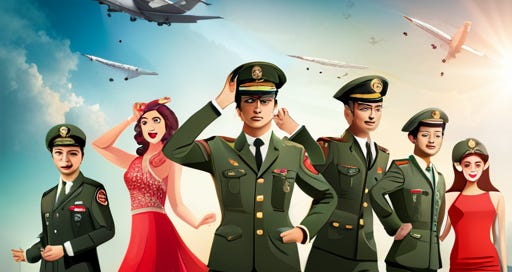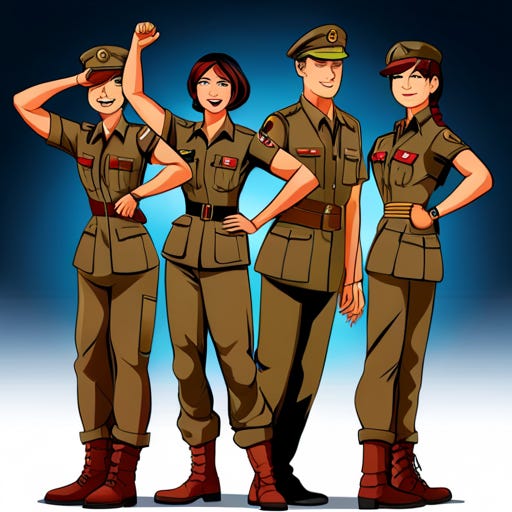Why Army Kids Thrive: Nurturing Success in "Fauji Brats"
Among 12 Reasons--the Unique Upbringing of Army Kids in an Environment Promoting Multicultural Exposure, Linguistic Fluency, Meritocracy, and Early Self-Reliance that Nurture Success
Introduction: The term "Fauji brats", often used to describe the children of officers from the Armed Forces of the Indian Union, may convey a negative connotation. However, the experiences of these Army Kids show that they are anything but brats. Growing up in the unique environment of the army life, they tend to develop well-rounded personalities and demonstrate success in various aspects of life. Let's explore the reasons behind their achievements and why they thrive.
Secular and Inclusive Environment: The Indian Army is known for its secularism, with officers and soldiers from diverse religious backgrounds. Army cantonments and field formations often have places of worship for different religions. This inclusive environment fosters a healthy upbringing for army kids, shielding them from inter-religious conflicts and promoting harmony.
Exposure to Diversity: Army officers frequently move from one station to another, exposing their children to different cultural, geographical, and linguistic environments. This exposure broadens their horizons, enhances their adaptability, and strengthens their overall development.
Punctuality: The Time-Tested Trait of Fauji Brats
One significant characteristic ingrained in “Fauji Brats” is their unwavering commitment to punctuality. Growing up in an environment that values discipline and adherence to schedules, these children learn the importance of being punctual from an early age. Whether it's attending school, extracurricular activities, or social events, they understand the value of being on time, a trait that continues to benefit them throughout their lives. Their consistent practice of punctuality reflects their disciplined upbringing and sets them apart in their future endeavours.
Enhanced Interpersonal Skills: Due to the nature of their parents' postings, army kids frequently make new friends and adapt to new schools and colleges. This constant change cultivates excellent interpersonal skills, making them sociable, friendly, and adept at forming connections wherever they go.
Multilingual Proficiency: Growing up in an environment where English is the common language among officers and family members, along with proficiency in Hindi and their mother tongue, army kids become fluent in multiple languages. This linguistic versatility enhances their communication skills and boosts their confidence in public-speaking.
Quality Education Opportunities: The Army runs some of the best schools and colleges in major stations, often following the CBSE pattern. These institutions provide high-quality education, with highly qualified teachers, including the wives of Army Officers. Army kids also benefit from preferential admission quotas to renowned higher education institutions like AFMC, Pune.
Exposure to Meritocracy: Unlike their civilian counterparts, army kids are generally oblivious to caste-based divisions and reservations. The merit-based recruitment system for defence services officers allows them to grow up in an environment where talent and ability are valued above artificial social divisions, fostering a sense of equality and fairness. In contrast to the civil kids, who get exposed to castes and quotas like SC/ ST and OBCs, they are quite oblivious to these man-made divisions. Nevertheless, with fewer army brats opting for careers in the armed forces, and an increasing large number opting aiming at IIT, IIMs, Medical Colleges and civil services, they too have necessarily picked up this lingo.
Manners and Etiquette: The Army places great emphasis on manners and etiquettes, and this culture permeates into the lives of army kids. Through their association with the Army Messes, they acquire refined social skills, instilling a sense of decorum and respect. This also gives them the confidence to mingle with the so-called elites and socialites, in their professional lives.
Leadership and Hierarchy: Rank and seniority hold significant importance in the Army. Army kids witness firsthand the significance of rank, which influences their understanding of leadership and hierarchy. This exposure equips them with negotiation and persuasion skills necessary to navigate social situations within the military environment. While the wives are more accepting of the rank and status, tagged to the respective and respected wives of the senior officers, the kids, especially daughters can be more “rebellious”. This sometimes leads to frictions where the professional assessment of a junior officer may get affected, at the hands of the senior.
Respect for Women: The Army upholds the highest respect for the wives of officers, creating a culture of reverence towards women. Even the General would address a young captain’s wife as “madam”. This culture, although evolving with the increasing commissioning of lady officers, instills a deep sense of respect and gender equality in army kids.
Early Self-Reliance: With army officers retiring in their early 50s, army kids often find themselves in a transition phase, still pursuing their education. This early self-reliance teaches them to become independent at a young age, as the perks and privileges of the army life gradually fade away.
Thriving in Modest Means: Army officers' superannuation packages are modest compared to other professions. Army kids grow up learning the importance of fiscal prudence and exercising economy, developing a sense of financial responsibility and resourcefulness.
Conclusion: The experiences of Fauji brats, or Army Kids, demonstrate that growing up in the army environment can be advantageous for their overall development and future success. From the inclusive and secular environment to exposure to diversity, quality education opportunities, and imbibing valuable life skills, these children often emerge as confident, adaptable, and well-rounded individuals. While generalizations have limitations, the positive aspects of the army life contribute significantly to their growth and prepare them to excel in various spheres of life.
_____________________________________________________
KBS Sidhu. The Author is an IAS officer of 1984 Batch of Punjab cadre, and retired from service in July 2021, as Special Chief Secretary, Punjab, after 37 years of service.
The images are created using Dream Studio #AI software and do not purport to be an actual representation of either the “Army Kids” or the Members of the Armed Forces.
He can be reached on kbs.sidhu@gmail.com or @kbssidhu1961 or https://www.facebook.com/kbs.sidhu






I forgot to mention an important reason-- PUNCTUALITY!
Well articulated. The resilience and character building opportunities the the defence forces environment offers kids is unmatched.